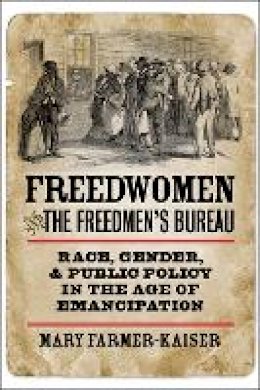
Freedwomen and the Freedmen´s Bureau: Race, Gender, and Public Policy in the Age of Emancipation
Mary J. Farmer-Kaiser
Established by congress in early 1865, the Bureau of Refugees, Freedmen, and Abandoned Lands—more commonly known as “the Freedmen’s Bureau”—assumed the Herculean task of overseeing the transition from slavery to freedom in the post–Civil War South. Although it was called the Freedmen’s Bureau, the agency profoundly affected African-American women. Until now remarkably little has been written about the relationship between black women and this federal government agency.
As Mary Farmer-Kaiser clearly demonstrates in this revealing work, by failing to recognize freedwomen as active agents of change and overlooking the gendered assumptions at work in Bureau efforts, scholars have ultimately failed to understand fully the Bureau’s relationships with freedwomen, freedmen, and black communities in this pivotal era of American history.
Product Details
About Mary J. Farmer-Kaiser
Reviews for Freedwomen and the Freedmen´s Bureau: Race, Gender, and Public Policy in the Age of Emancipation
-Rebecca A. Kosary University of North Carolina at Charlotte "Mary Farmer-Kaiser's much-anticipated and excellent new book, Freedwomen and the Freedmen's Bureau, offers the first systematic examination of what she calls 'the gendered nature of bureau work.' In masterful fashion, she explores the work of the Freedmen's Bureau as an institution while simultaneously placing the former slaves, women in particular, at the center of her analysis. In doing so, she convincingly demonstrates, in refreshingly clear and jargon-free prose, that issues of gender are essential to any understanding of the bureau and of emancipation.
-John C. Rodrigue Stonehill College, author of Reconstruction in the Cane Fields: From Slavery to Free Labor in Louisiana's Sugar Parishes, 1862-1880 "Farmer-Kaiser made extensive use of field office records and the commissioner and assistant commissioner records for Virginia, Georgia, Louisiana, and Texas, chosen for quality and the geographic, demographic, and economic diversity they presented." -American Historical Review
